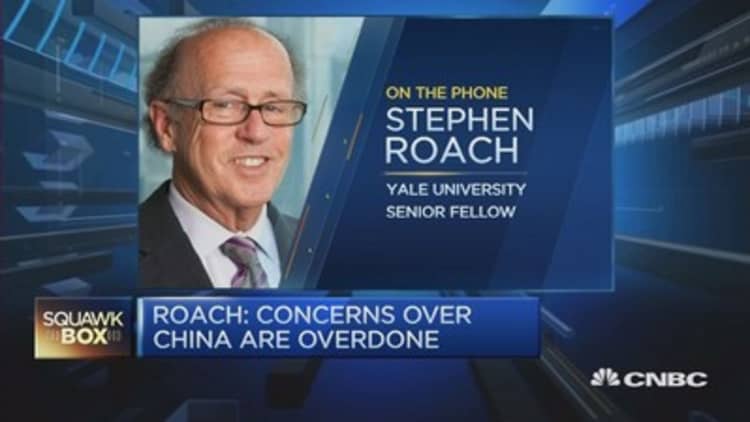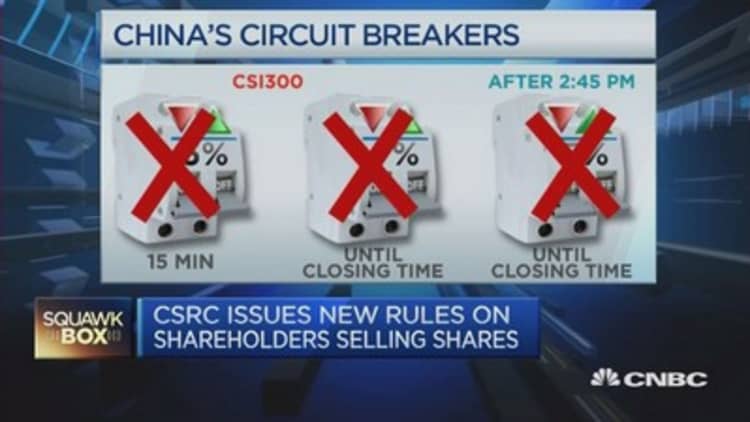


The wobbles in China that rocked financial markets this week have not only cast doubts over the economy, they've also shaken confidence in policymakers' ability to stem the volatility.
For two decades, China's frenetic growth has been the source of the world's envy, with investors placing faith in the ability of policymakers to help transform China from a manufacturing-led powerhouse to a consumer-driven economy . As the economy stutters and regulators scramble to contain wild moves in the yuan and stocks, analysts are calling out what appears to be a ham-fisted approach to managing market volatility.
"Market volatility this week suggests that nobody really knows what the policy is right now. Or if the government itself knows or is capable of implementing the policy even if there is one," DBS said in a currency note Friday.
"The market's message was loud and clear that more clarity and less flip-flopping is needed going forward."
China-listed stocks plunged this week, with trade suspended completely in two sessions after the CSI 300 index dropped more than 7 percent, triggering a circuit breaker meant to limit market volatility.
The China Securities Regulatory Commission (CSRC) suspended the circuit-breaker system, implemented for the first time on Monday, before the start of trade Friday.
The quick regulatory flip-flops spurred a lot of derision among social media commentators.
"The CSRC all treated us as experiments to make history. When it failed, it concluded with 'lacking experience,' and that's it," Weibo user Li Hua posted. "I strongly call for resignation of related personnel who designed this policy! There's no cost of failure so that decision makers can do whatever they want."
Another factor weighing on faith in China's regulators: Policy makers at the central bank, the People's Bank of China (PBOC), have tinkered again with its currency without providing much indication to the market about its endgame.
On Thursday the PBOC by the most in five months, to the lowest level since 2011.
But the PBOC is also suspected of intervening several times this week, including Friday, to slow the renminbi's decline. Data on the mainland's foreign reserves, released Thursday, also showed the biggest annual drop on record in 2015, suggesting that the central bank has sold dollars to support the yuan.
China's central bank lets the yuan spot rate rise or fall a maximum of 2 percent against the dollar, relative to the official fixing rate.
Reuters also reported Friday, citing three people with direct knowledge, that the foreign-exchange regulator ordered some banks to limit purchases of U.S. dollars this month to help stem capital outflows.
"The PBOC has, in fact, been resisting currency depreciation and they've been trying to slow down the market's desire to push the currency down," Eswar Prasad, senior fellow at the Brookings Institution and the former head of the IMF's China division, told CNBC on Friday.
"The problem is when you try to slow things down and don't articulate a clear strategy and especially when all of this is happening at a time when there is a great deal of concern about the underlying state of the Chinese economy, that adds to panic of investors who start trying to take capital out of the country, foreign investors who are less interested in investing in the country and that feeds into even more panic and volatility, which is what we've been seeing in both the currency and the equity markets."
Others also expressed concerns about China's regulatory mixed messages.
"On the one hand, they want to let markets to play a decisive role in the process," Stephen Roach, a senior fellow at Yale University and a former chairman of Morgan Stanley Asia. "But then when the markets play a more decisive role, they resist, they react, they make regulatory missteps that they then have to go and correct. They're sort of caught in a never-never land between markets and managing a price levels and that's a difficult place for any regulator to be."
The latest market turmoil marks the second recent black eye for China's regulators.
Their response to last year's mid-year market plunge on the mainland was much derided. That plunge - of more than 30 percent off previous highs at some points - followed a rapid rally of more than 100 percent in less than a year, fueled in large part a huge buildup of margin lending after regulators allowed investors to open as many as 20 trading accounts each.
As that credit-fueled bubble popped, the Chinese government stepped in with a slew of policy changes, including a virtual ban on short-selling, serious restrictions on selling by major shareholders and the loosening of margin lending regulations.
That misstep doesn't appear to be forgotten by Chinese commenters on social media.
"Look what CSRC has done, I'm speechless. It's you who allowed twenty capital accounts per person, it's you who introduced the leverage mechanism, it's you who tried to get rid of leverage, it's you who brought us the circuit breaker, and now it's still you who suspended the circuit breaker," wrote Weibo user Gu-er Kevin Friday. "You made such a huge market to be a total mess."
Some experts, however, believed that Chinese policymakers were committed to reforms.
The chief executive of DBS, Piyush Gupta, may not be entirely in sympathy with the banks' economists when it comes to evaluating regulators.
"The Chinese authorities are really focused on financial sector liberalization. They're doing that faster than anyone expected," Gupta said Wednesday at a luncheon for the bank's private-banking clients. "When you start driving for financial market liberalization reform, you will see a lot of market volatility."
But views on how regulators are handling that volatility are being clouded by the misconception that China is "one person (and President Xi Jinping) makes all the decisions, Gupta said.
"We are 21,000 people in DBS. I don't make all the decisions in DBS. How can Xi make decisions for 1.2 billion people," he asked. "There are a lot of different people in China: the central party in Beijing. The PBOC has a different agenda. The CSRC has an agenda. The CBRC has an agenda. And different people march to different tunes. They're broadly orchestrated but it doesn't mean everything done is carefully calibrated each time."
Correction: This article has been updated to reflect that Thursday's yuan fixing was the lowest since 2011.
- Evelyn Cheng and Neelabh Chaturvedi contributed to this report
—By CNBC.Com's Leslie Shaffer; Follow her on Twitter @LeslieShaffer1




